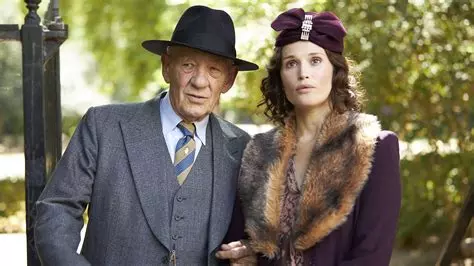This British film tells the story of a feared theatre critic. He does a critical review of an actress whose acting conflicts with his opinion, and he becomes heavily implicated in what follows.
THE CRITIC. Starring: Ian McKellen, Gemma Arterton, Mark Strong, Ben Barnes, and Lesley Manville. Directed by Anand Tucker. Rated M (Mature themes, sexual references and coarse language). 99 min.
Review by Peter Sheehan, Associate of Jesuit Media, Australia
The film is a period thriller and based on a 2015 novel, “Curtain Call”, by Anthony Quinn. The screenplay for the movie was written by Patrick Marber. Ian McKellen plays an ageing, gay theatre critic, Jimmy Erskine, who is contemptuous of most people. He is arrogant, brutal and spiteful, and is a feared, powerful critic of the London theatre scene in the 1930s. He reviews for “The Daily Chronicle”, a politically conservative newspaper in pre-war London.
Erskine delights in destroying the reputation of actors and actresses who disappoint him; he loves to pan theatrical productions; and he gives a terrible review to the acting of Nina Land (Gemma Arterton), who is a young, struggling actress. Nina’s mother, Annabel (Lesley Manville), is worried, and Erskine has a new boss (following the death of the paper’s founding proprietor) in Viscount Brooke (Mark Strong). Brooke is especially uncomfortable with Erskine’s nocturnal encounters with gay men in city parks, and he wants a family newspaper that doesn’t pander to Erskine’s proclivities. Brooke is aware that his paper’s chief critic is a gay exhibitionist, and further conflict occurs when he learns that his son-in-law, a fashionable portrait painter, Stephen Wyley (Ben Barnes), is sexually involved with Nina. When Erskine sets up Brooke for Nina to seduce him, the movie veers decidedly to the dark side. Death presents itself as a solution to personal anguish, and Erskine and others become entangled in a web of deceit.

The development of the film’s plotline is heavy-handed, but McKellen’s assured acting style rises above it. The film is visually striking, cinematography is impressive, and camera lighting evocatively sets the mood for an impressive period thriller. When Erskine gets sacked, the plot goes very dark. Erskine, under pressure, tries to get his job back by using Nina to ensnare Brooke, and lures her with promises that he will provide good theatre reviews for all her future acting performances. His scheming, however, leads to dire consequences that include suicide, murder, and betrayal.
McKellen is eminently watchable for his putdowns, acting style, and attention-getting asides as a needy critic. The film is less successful in its critical analysis of 1930’s Edwardian London as a society trying to cope with fascism on the rise, as World War II looms. McKellen’s reputation as an exceptional actor in roles that have been closely evaluated by multiple critics in the past, provides unusual interest.
Peter W Sheehan is an Associate of Jesuit Media


